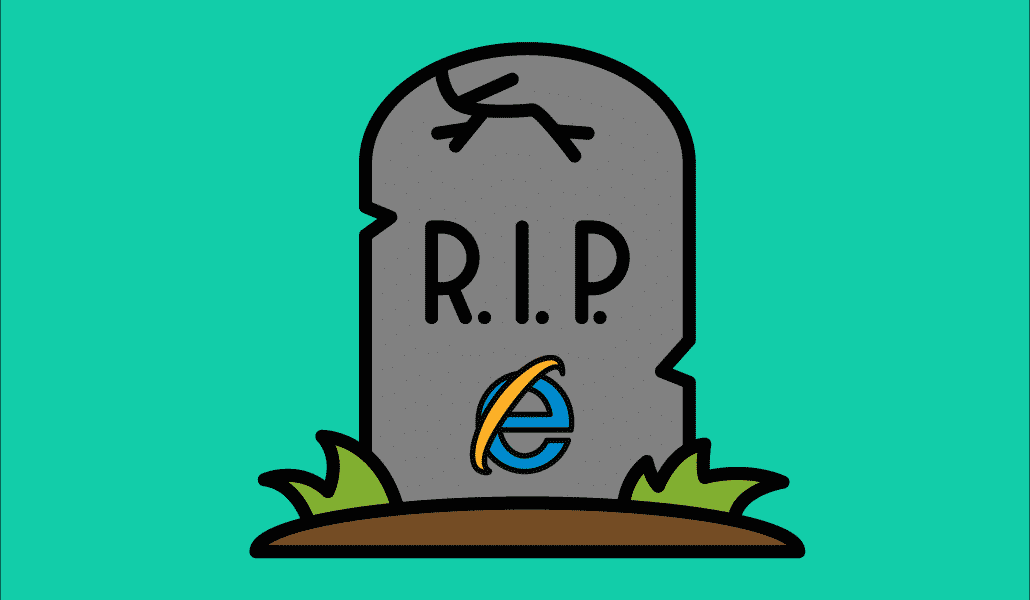
We abandoned Internet Explorer 11 and so should you!
In 1995, Microsoft released its first version of Internet Explorer and blew everyone’s hat off. Finally, web designers & developers had a browser that supported CSS, Java and applets.
As time went by, Internet Explorer grew and became known for its incredible speed, dynamic HTML and available across all platforms by IE4. By 2003, Internet Explorer had become by far the most widely used web browser, with a usage share of about 95%.
But 2003 is long gone, for which my hair and wardrobe are thankful. My computer is thankful too, because here in 2020, almost 2021, we have options for web browsers other than IE. In fact, no one should be using Internet Explorer 11 at all.
Why should you quit supporting IE11?
Here are the top 6 reasons that will convince you to throw that beast in the garbage.
IE11 has mediocre support
IE11 will only be supported until Windows 10 reaches the end of its life, however support will be minimal – security and bug fixes. While Windows 10 won’t reach its end of life until August 2025, that isn’t that far away (I know, it’s weird to think about), and it’s important to start planning ahead. It’ll probably continue to get technical updates from Microsoft forever, but it’s pretty much to keep it at the bare minimum of functionality.
I don’t know about you, but “bare minimum of functionality” isn’t in our mission statement. If you want to provide your customers more than the least possible performance, then IE11 isn’t for you.
IE11 is slower than a 1 legged dog on tranquilizers!
Okay, I didn’t actually measure the speed of a 1 legged dog on tranquilizers, so I admit my end of this research is flawed. But, according to Top 10 Reviews, IE11 “took 4.55 seconds to boot up and load websites.” While some sites “only took about 2.75 seconds to load,” even that lower time is double the time of the best browsers reviewed by the site. That means the 4.55-second average is about 3.5 times slower than browsers like Firefox or Chrome.
It’s at least this slow.
4.55 seconds might not sound like a long time, but consider this: 47% of consumers expect a web page to load in 2 seconds or less. The likelihood of page abandonment also goes up the longer the page takes to load. And when Firefox and Chrome can get the job done 3.5 times faster, IE11 doesn’t bring much to the table.
IE11 is a web designer’s nightmare
Because IE11 doesn’t support modern JavaScript standards, supporting IE11-compatible websites means you have to use the JavaScript it does support.
To work in IE11, JavaScript must be compiled to ES5 instead of ES6, which increases the size of your bundles up to 30%. That makes performance significantly awful for the portion of your audience that isn’t using IE11 and limits your ability to use the features that newer JavaScript standards provide.
Plus, IE11 doesn’t support many modern CSS properties, which means you have to oversimplify your design as well as your code.
Worst of all, the developer needs extra time to make sure everything is IE11 compatible. So your development team is spending more time to build a website that isn’t as good – and, as we’ll discuss later, not many people are using – instead of spending their time on new features and improvements.
To those of us who aren’t developers, simply hearing that IE11 doesn’t support modern JavaScript and CSS might not mean much. But most people understand that additional costs and time are not ideal.
IE11 has terrible security
IE has a reputation of inadequate security, but it’s gotten even worse recently. Now just having Internet Explorer on your computer at all can expose you to security threats.
John Page, a security researcher, unearthed an exploit in the way IE handles MHT files that allows hackers to steal Windows users’ local data. And because MHT files are opened in IE by default on Windows machines, all you have to do is click on an email attachment to open yourself up to this problem.
That’s not even the worst part of this recent security issue. When Microsoft was informed of the vulnerability, they “declined to consider the bug for an urgent security fix.”
So, if you prefer not having all your local data stolen, consider not only dropping support for IE11, but also getting it off your computer completely.
Even Microsoft thinks you should stop using it!
Just when it seems like IE11 can’t have a lot else wrong with it, its parents are even giving up on it. Microsoft’s worldwide lead for cybersecurity, Chris Jackson, calls IE a “compatibility solution” rather than a browser and says the company is not supporting any new web standards for it. He even says you should only use IE for sites where it’s needed and points users to tools that help you transition to better browsers.
Basically, IE11 now only exists to support the sites that use it until they’re modernized, and the people who made it are even saying so.
If the company that built IE11 is now telling you to stop using it, maybe you should!
What about my customers?
You’re right to be concerned about the customer experience on your website. If you stop supporting IE11 while customers are still using it, what will happen to those customers?
According to a report from NetMarketShare, less than 10% of desktop and laptop web traffic comes from Internet Explorer and it makes up less than 3% of all web traffic across all devices. It’s reasonable to assume that not many users are coming to your website from Internet Explorer, but it’s a good idea to check into your site’s specifics.
When we examined our Google Analytics, we learned that only about 2% of XplodedTheme’s visitors came from all versions of IE since mid-2016. That’s an incredibly small portion of our audience that doesn’t provide a significant portion of our revenue. Plus, the revenue they do bring probably wouldn’t balance out the extra time our developers spend making sure everything is compatible with IE11.
We’re a lot more interested in spending time and money keeping our site looking and working great for the other 98% of our visitors. It’s not that we don’t care about the other 2% – we just want to make the biggest impact for the greatest number of people as well as motivate the 2% to upgrade their browser!
In brief, supporting IE11 does nothing to improve your website. It’s probably making it worse. Continuing to support the browser closes you off from using many future apps, features, and design elements that IE11 isn’t able to handle.
If you don’t want to miss out on the incredible things you can do on the web, then quit supporting IE11 – with a window of warning for your customers that do use it.
Explain your decision to no longer support IE11 to your customers, too. While some people may not understand the technicalities, most people are delighted to know you’re putting your energy into optimizing their website for the largest audience, faster load times, and outstanding features.

